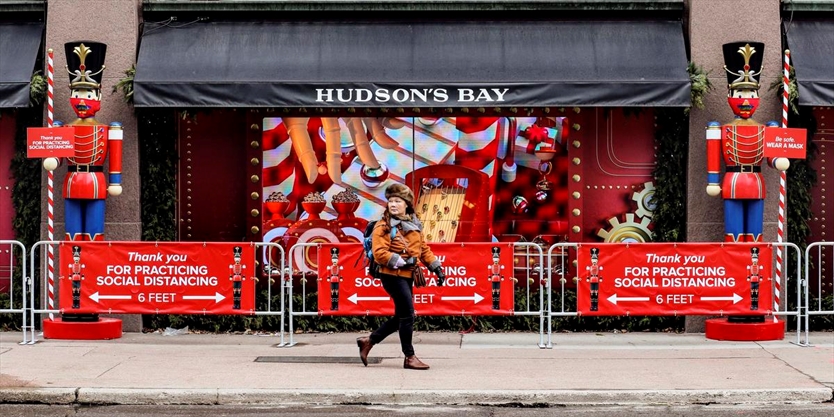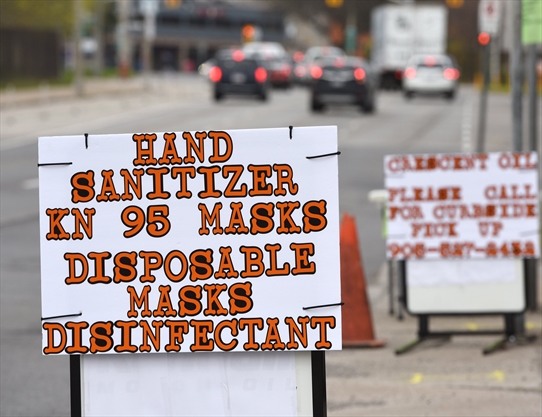Rosie DiManno: Unfair lockdown rules, creative compliance (what a mess)
Balls of brass, The Bay.
For many months, I’ve been dropping by Pusateri’s, in the upscale Sak’s Food Hall in the basement of The Bay’s flagship emporium at Yonge and Queen, wondering when it might re-open. The coming-soon signs kept changing, most recently announcing Pusateri’s would be back in 2021.
They jumped the gun by 53 days. If only, following significant shaming, fleetingly – open Monday, the first full day of Toronto’s lockdown 2.0, closed by Tuesday. Ditto the entire department store.

I did think it odd, on the weekend, buying a pile of stuff at The Bay’s children’s department, when the clerk assured me not to worry, staff had just been told the store wouldn’t be shuttering as most of the city zippered up again. “I’m not sure how but The Bay has received permission to stay open.’’
No they didn’t, it appears.
Such an audacious workaround – runaround – of the reimposed rules nobody likes but to which most are adhering: Exploiting the narrow food vending component – groceries are essential – to keep the cash-registers cha-chinging for all the rest of The Bay’s merchandise. Dancing on the head of a tin of caviar.
The spin-bumff to my colleague claimed the company believed it was in compliance with the lockdown fiat Premier Doug Ford has triggered anew because of Pusateri’s, a feature only of the downtown location, which is why the chain’s other stories in Toronto and Peel had shut its doors.
As per the email sent to Rubin: “We understood this to be in line with the province’s direction, however we have now made the decision to close our Queen Street store (Tuesday).’’
Yeah, pull the other one.
To emphasize: While the rest of the department store had been functional since June, the Food Hall remained sealed up tight, for reasons never explained. But clearly Pusateri’s wasn’t considered essential for The Bay’s bottom line. And this is a retailer – the Hudson’s Bay Company – in a whole heap ‘o fiscal distress.
On Sunday, before the lockdown came into effect in Toronto and Peel, the two hot spots in Ontario, shoppers arriving at The Bay location at Centerpoint Mall, Yonge and Steeles, were confronted with a posted notice from the landlord saying the store’s lease had been terminated. The company has been rent delinquent at other locations across the country. Most recently, a Quebec judge ordered Hudson’s Bay to pay rent at several department stores in that province. A store has also reportedly been shuttered in B.C., for nonpayment of rent.
An Ontario judge has ordered the company to pay half the outstanding rent at its Richmond Hill location to avert eviction.
But suddenly Pusateri’s was the critical link at Yonge and Queen, even though most of the shelves were empty —no fresh produce, nothing in the dairy fridge, prepared foods section closed. Stock some gourmet items, fancy pasta and oils, however, and Bob’s your uncle.
Sell vittles and all the merchandise is your oyster.
Not so slick and now scuttled.
“I had literally 500 members in the GTA and Peel reach out to say, if they started to sell apples and bags of chips, can they become an essential service provider and therefore skirt the rules?’’ snorts Dan Kelly, president of the Canadian Federation of Independent Business (CFIB). “Many of them are asking tongue-in-cheek, but not really.
“That’s pretty brazen, to make the case that you’re an essential service because you’re got a tiny food department in your store. It would be like Winners claiming they’re an essential service because they sell boxes of chocolates.
“If they were successful, I’d say mazel tov, every small retailer would be able to do the same thing, but on a much smaller basis.’’
Much of the public might have a soft spot for The Bay because of its iconic status as a Canadian institution. Except the Hudson’s Bay Company has been American-owned since 2006.
One might even have a tad of admiration for the company’s chutzpah, finagling the regs. But did they think nobody would notice and competitors wouldn’t complain? Whinges that were relayed to a clearly unaware Ford on Monday, who merely observed it was “unfair’’ and big box stores shouldn’t circumvent the rules while so many small businesses have been forced to roll down the awning.
Well, that’s the crux of the thing, isn’t it? The province’s lockdown mandate for Toronto and Peel – adamantly advanced by the public health care sector, infectious disease experts, their acolytes in the media and armchair epidemiological modellers, none of whom are facing a livelihood crisis – is clear as mud, most particularly in its exclusion of big box stores from limitations.
A patron can’t shop for a novel at an independent book store but can do so at, say, Costco, or any Shopper’s Drug Mart with a rack of paperback bestsellers. Can’t in-person shop for Christmas gifts at Roots or Sephora but all the schmutta and tat you want from Walmarts is okey-doke.
We are clearly not all in this together and, yet again, the brunt of the burden, the economic fallout, has dropped on the heads of small business owners.
As of two months ago, those nostalgic freedom-flexing days of late summer, days of late summer, Kelly’s organization had projected that an average of 160,000 small businesses – one in seven approximately — would permanently close as a result of coronavirus restrictions. If not lives lost, very much livelihoods lost. That figure doesn’t include “zombie stores” that have hung out a closed sign in the desperate hope, fading, of some day reopening.
On the subject of The Bay’s sly gambit, Kelly says: “I find on one level hard to criticize them because every retailer is in a fight for their life. These restrictions, literally the government has signed their death warrants. And I understand why they’re pushing back against the actual death of thousands of Ontarians. At the same time, there’s been a huge shift since the spring lockdowns.”
Much as CFIB members grumbled about the lockdowns in March, they understand that immediate and blunt action was necessary to protect society, even if poorly thought out and clumsily imposed. But provincial governments have had some six months to get it right the second time around, which every authority warned would be coming in the second wave of the coronavirus.
“What’s different is that we know an awful lot more about COVID-19,” says Kelly. “We know how it’s spread. Businesses have taken huge numbers of precautions to protect their customers and their staff. I’m not for a second suggesting that there’s no risk in a small retailer. But independent businesses are being shut down not because the business activity is more risky than other activities, but to send a message to the public. That’s what’s really upset the small business community so much. And then on top of that to have these restrictions put in place with such an arbitrary saw-off.”
What is the point of shutting down a small business that might have a handful of customers on the premises at the same time and essentially all that traffic, from many such business, to the so-called big box stores, resulting in crowds as thick as those in supermarkets? “It’s actually making COVID exposure worse by pushing all that traffic to a handful of big box stores,” Kelly argues.
Filling their carts with essentials and non-essentials. Because they can.
In Manitoba, at least, the unfair lockdown order has been somewhat addressed by a new rule, announced last Friday, that prevents large retailers – those permitted to remain open, selling essential goods in-store, from selling any non-essential goods, other than online or via curbside service.
This isn’t quantum physics.
“It’s a lot easier to buy from Costco or delivered by Amazon than trudging down and picking it up outside the store,” says Kelly. Especially when there’s no in-store experience – the browsing, the person-to-person consulting – that draws shoppers to smaller shops.
It shouldn’t be so hard to find, as Kelly suggests, a better saw-off for these deeply threatened independent businesses and the staff they employ. A reasonable strategy would be, say, permitting three customers in-store at a time, with three staffers. “It would allow at least a heartbeat of economic activity for the small guys and take some of the pressure off the big guys.”
Pressure? In the second-quarter for 2020, Walmart’s sales shot up by 13.9 per cent over the previous quarter. Globally, Amazon has enjoyed record-breaking sales of $4.6 billion in 19 countries, including Canada.
Meanwhile, all that inventory ordered by small businesses for the make-or-break Christmas spend-a-thon is just sitting there for at least another 25 days of lockdown.
The disease is real, unrelenting and doesn’t give a rat’s ass about red ink splashed across bookkeeping records.
But government should offer a better economic solution than slam-bam-thank-you-scram.
Rosie DiManno is a Toronto-based columnist covering sports and current affairs for the Star. Follow her on Twitter:



 Personal protective equipment, including N95 masks and latex gloves, have been in high demand since the pandemic was declared. – Richard Lautens/Torstar file photo
Personal protective equipment, including N95 masks and latex gloves, have been in high demand since the pandemic was declared. – Richard Lautens/Torstar file photo